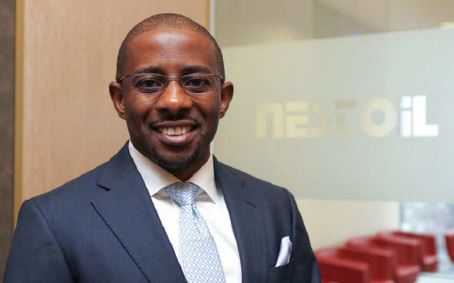Nestoil: Africa Should See Gas as a Resources Beyond Oil
Dr. Chukwueloka Umeh, Group Chief Operating Officer of Nestoil Limited, has said that Nigeria and other African countries should see gas as a resource beyond oil, as other developed countries are already moving away from fossil fuels to clean energy.
Dr. Chukwueloka revealed that the world is now steadily shifting to clean energy, and the focus on oil has started to decline. And, many countries in Europe are at the forefront of this energy revolution.
He further explained that it is high time that Nigeria should change its energy focus from oil to gas. He adds: “With its position as the 9th largest gas reserves in the world, we have the resources to do that. The will is also there. The only thing missing is the innovation to build a sustainable gas economy in the country.
“Currently, the only guaranteed gas income stream comes from production
and exportation of LNG. This is understandable because the energy value chain, which taps into the gas reserves in Nigeria, is broken, and cannot therefore reliably pay for gas.”
He also said that there should be a kind of innovative approach for the gas industry to function effectively as some of its value chain such as transportation, usage in power generation, petrochemicals generation & agriculture, power distribution, is broken.
“We cannot put the cart before the horse, therefore for the gas industry to work, the gas off-take and the means for collecting revenue to pay for it must work. Herein lies the required innovation.
“We cannot simply copy and paste what has worked in other developed or developing countries. We must leverage learning from other countries to create our semi-unique methods that will work. We have done this successfully in several other industries.
“For example, Telecoms (data and voice) works very well in Nigeria. We have the highest internet penetration in Africa, with 55% in Nigeria alone. This is an average of 1 in 2 people (111 million people in 2019) with internet access in Nigeria. The Telcos divested from owning towers, and left that to the likes of IHS, while they focus on the business of providing quality voice and data services within their allocated frequencies.
“Competition amongst them and intelligent regulation by the National Communications Commission (NCC) have created a market where subscribers have the option of enjoying services from several different providers – MTN, Glo, 9 Mobile, and have the ability to switch between providers if the pricing or quality of their service provider no longer suits them.
“This is a proper industry driven by market forces. Tower companies, left to provide uninterrupted infrastructure to run their equipment are compelled to power their thousands of towers almost exclusively on diesel generators.
“Though somewhat primitive, this is their innovative response to keep the telcos running 24 hours a day, 7 days a week. Competition has also aided the birth of smaller companies like Smile, IPNX, to name a few, who provide primarily quality data service, and now also voice service at competitive pricing.
“The telecoms industry works because the companies did it our way, for our market, and primarily, because the government regulations were relaxed enough to allow the industry to grow, and develop and the competition was allowed to drive pricing and product offerings.
“Imagine if we replicate this in the energy industry. Imagine a situation where private power generating companies, GENCOs, secure the required licenses without having to deal with too much bureaucracy.
“They would develop IPPs within 2 – 4 years, secure the required investment based on bankable agreements with the off-takers, and build plants.
“They would be able to deal directly with privately-owned distribution companies, DISCOs, and large industrial, commercial and residential clusters, selling power to them at cost-reflective tariffs, i.e. tariffs that are economically viable and allows the GENCOs to repay their loans, pay their fuel suppliers and make a decent return.
“DISCOs would be allowed to sell power at a cost-reflective tariff that allows them to make the required investment to meter most of the customers within their network, and generally improve their network, and also make a decent return. Like the tower companies in the telecoms industry, ultimately, DISCOs would likely be split into companies that own the cables and transformers for distributing power, while Power Traders would use this infrastructure to get power to their end customers.
“The customers themselves would be able to buy power from the power trader of their choice, depending on price. In this scenario, competition for customers’ business would drive pricing.
“Bringing this home to the oil and gas industry, GENCOs would buy gas from gas producers, who in turn would be able to deliver their gas on pipelines owned either by NGC or private companies. With the increase in the number of GENCOs, DISCOs, and metered customers, more gas pipelines would be built in the country.
“A true gas grid would, therefore, be born. Nigerians would have cooking gas piped directly to their homes instead of carrying ugly gas cylinders around. Imagine how many pipeline EPC companies would have to grow to meet the demand? More companies like Nestoil would spring up and grow. Imagine it.
“We look at a nation like China, who turned their economy around in 20 years; the primary catalyst was the country’s strong stance to invest in building a robust infrastructure. They built large baseload power plants in many locations to provide reliable power to its growing manufacturing industries.
“With these power plants that run primarily on coal, they can produce goods at competitive prices. Anywhere you visit in China, you would see its bustling economy, with a considerable percentage of its citizens being elevated out of poverty each year.
“I have imagined the scenario I described, and it is simply remarkable. It would be the beginning of the much talked about growth in our economy. Anything short of this is a dream that would never come to pass.”



